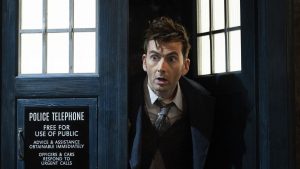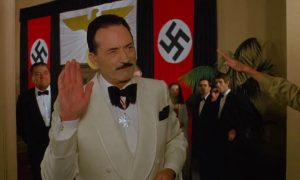Ryan Fleck and Anna Boden’s Freaky Tales, a madcap 1987 Oakland-set anthology, is a lot. Told in four loosely threaded together chapters, this interconnected story of the intersection of corruption, subculture, and violence in Reagan-era west coast America bites off more than it can chew, becoming more of an implosive collision than a meaningful exploration of much as it stretches on. As is often the case with anthological features, each individual story only feels half-baked, the germ of a story not afforded the room to grow and develop into something more. They’re connected in only the loosest of senses, making the sloppy whole certainly less than the sum of its sometimes interesting parts.
It would be a challenge to pinpoint exactly what Freaky Tales is about. There’s a Nazi v. Punk turf war, a gender-fueled rap battle, an underground poker tournament, a tough-as-nails enforcer, some hand-drawn cartoon animation, Blaxploitation-tinged martial arts, and a wraparound extraterrestrial element that is just…there. The film is stuffed to the point of breaking with ideas, themes, character, styles, and genres; like a forest floor of fauna vying for dominance. The heavy presence of American Nazism is the easiest constant to call out though I’m not entirely sure what the script, also from Fleck and Boden, wants to say about Nazis other than… they are bad?
Featuring a sprawling ensemble cast that includes A-list talent like Pedro Pascal and Tom Hanks, indie darlings Ben Mendelsohn and the late Angus Cloud, and a handful of fresh new faces in Jay Ellis, Normani, Normani Koredei Hamilton, Dominique Thorn, Ji-Young Yoo and others, few of the characters make a huge impression. The performances give their all with the material, but the primary issue lies in the underdeveloped script. As characters begin to show depth, the film swiftly moves on, leaving them behind. Pulp Fiction, this is not.
The first chapter introduces us to a pair of punk rockers (Champion and Ji-Young Yoo), who share moments of flirtation between readying themselves for the all-too-frequent skinhead invasion of their local punk venue. This opening chapter flashes promise, blending ultra-violence with an anarchic stylized verve. It also reveals the shallow, one-dimensional storytelling that goes on to define the feature. The second chapter, about two up-and-coming female artists, Entice (Hamilton) and Barbie (Thorne), trying to infiltrate the underground Oakland hip-hop scene, doesn’t really fit into the overall story at all, though it’s intriguing enough as a throwback to the emerging music scene of the time.
The third chapter ostensibly sees Fleck and Boden pull out their A-game and features Pascal as a crestfallen hitman whose last day on the job is interrupted when his pregnant wife is murdered. Though Pascal settles easily into the role of world-weary bruiser, it’s one of the weaker chapters in that you really start to feel the strain of the various vignette’s truncated nature. Just when his story begins to climax, we move on. Again. The fourth chapter focuses on NBA Golden State Warrior Sleepy Floyd who sees a record-setting game turned upside down with the interference of the same Nazi criminal league poking their nose in all the other character’s business. The narrative fibers conjoining the various segments are threadbare when not abjectly nonexistent; leaving this critic to wonder what qualified this or that story to be included in this sprawling late-80s saga that closely resembles one of the mix tapes that an upstart street salesman hawks somewhere in the middle of this feature.
Tonally, Freaky Tales is all over the map. It traverses the middle ground between camp, satire, noir, comic book, and sleaze, without really settling on a defining sense of what it is. One is left to wonder if the film, the fifth collaboration between long-time writing and directing partners Fleck and Boden, is the symptom of an impending creative divorce. The discord between the four tableaus overshadows any harmony, leaving viewers perplexed about what is meant to bind this disjointed effort together when evidently all the king’s horses and all his men can’t put it together again.
CONCLUSION: As is the case with most anthologies, Freaky Tales struggles to justify its existence as a whole. Though each individual portion is entertaining enough in itself, one is left a bit exhausted by the final product, and unclear on its artistic intent.
C
For other reviews, interviews, and featured articles, be sure to:
Follow Silver Screen Riot on Facebook
Follow Silver Screen Riot on Twitter
Follow Silver Screen Riot on Instagram
The post Sundance ’24: ‘FREAKY TALES’ A Disjointed Tapestry of Stories, Ideas, and Tones, with Nazis appeared first on Silver Screen Riot.











